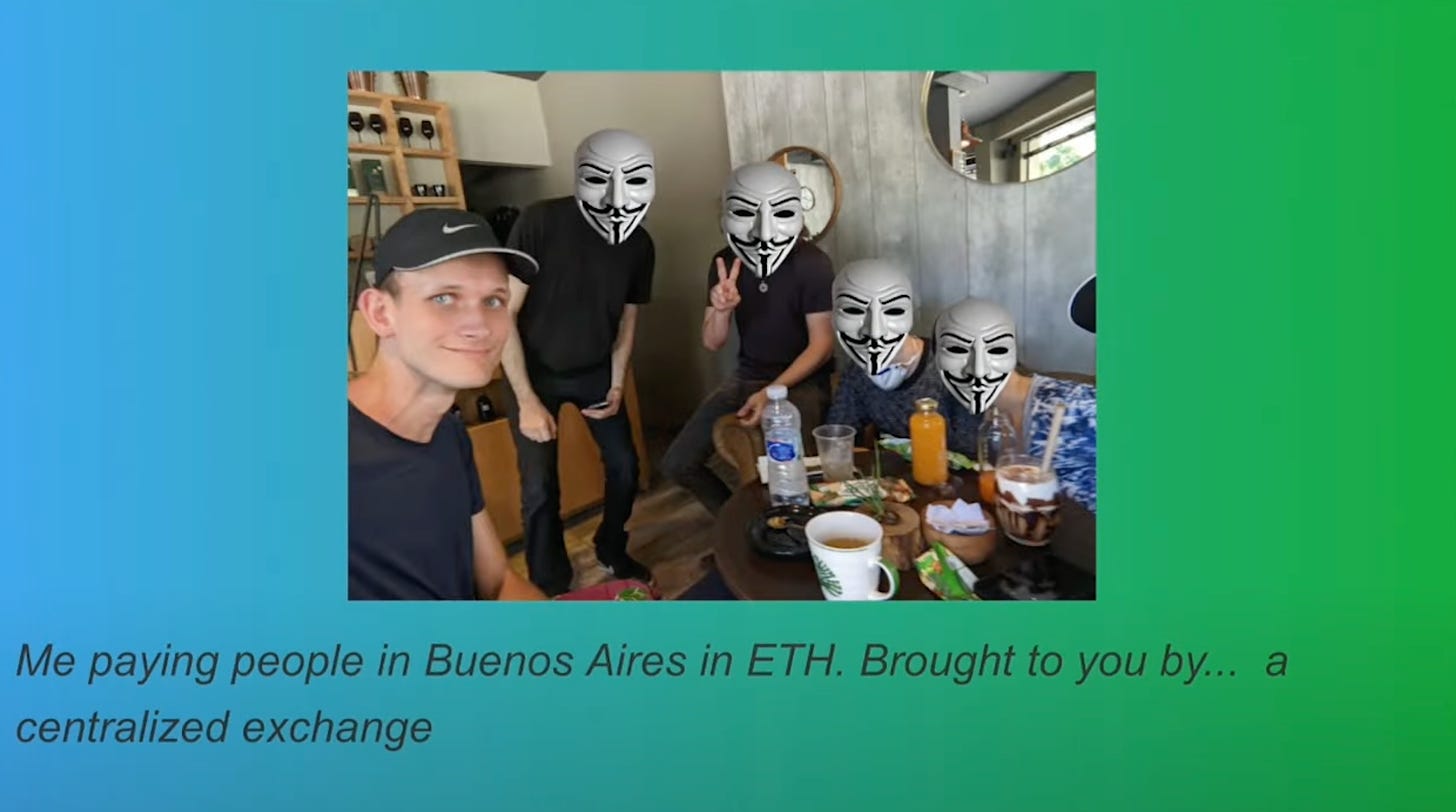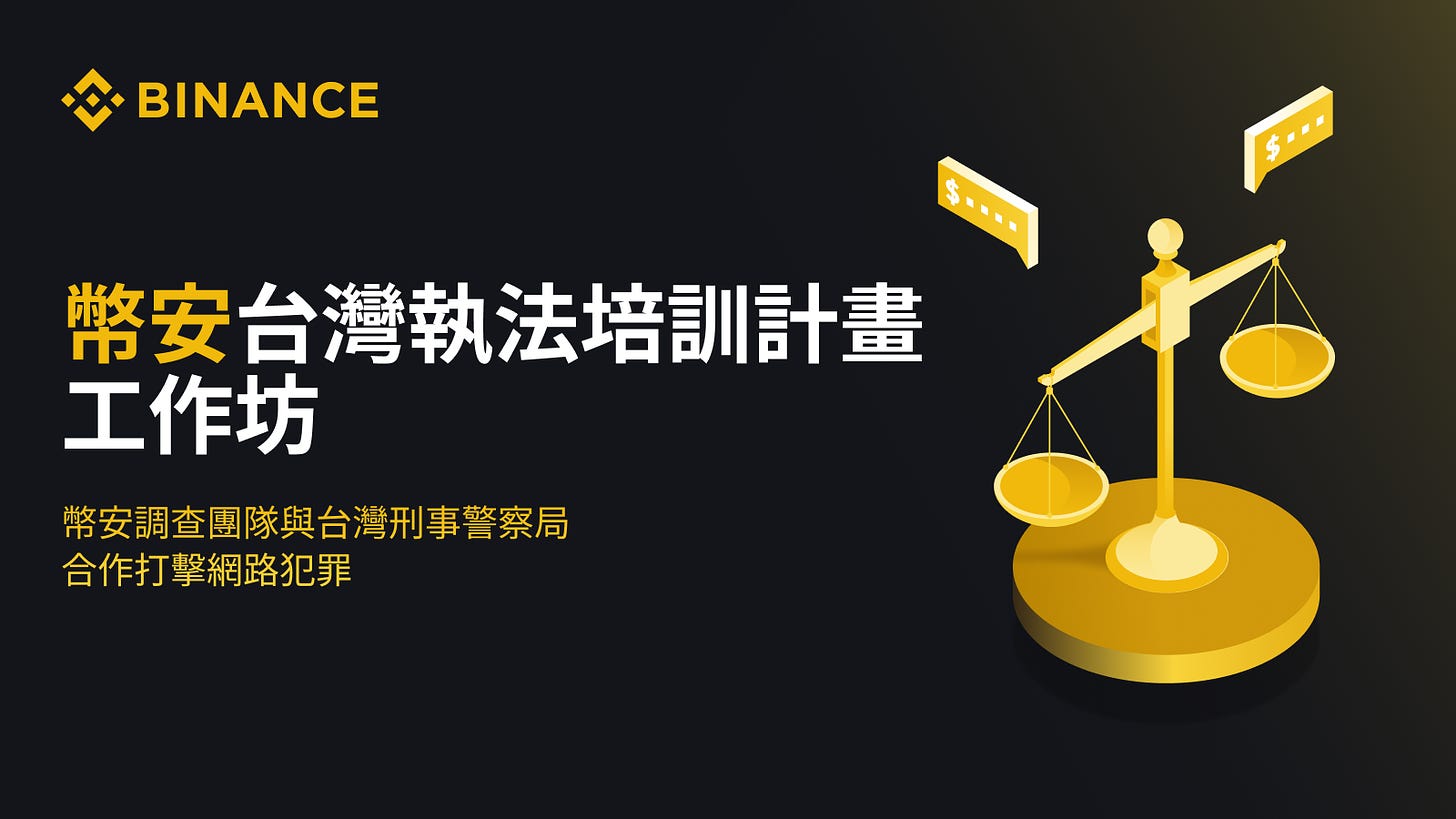GM,
Blocktrend member gathering is on this Saturday afternoon. Therefore, I will send out pre-event notifications tomorrow. If something comes up so that you are unable to attend the event, feel free to reply directly to my email. Additionally, Blocktrend is currently participating in the Gitcoin Grants 19 public goods fundraising. We welcome small donations to support us.
This Friday evening at 8 PM, I will be on Twitter Space (join link) to explain the operational process and address challenges you may encounter in verifying Gitcoin Passport, cross-chain transactions, and the voting process! Those who haven't participated in Gitcoin micro-donations are also welcome to join. Let's get into the main topic!

Binance CEO Changpeng Zhao (CZ), head of the world's largest cryptocurrency exchange, pleaded guilty yesterday in court, acknowledging violations of U.S. anti-money laundering and international sanctions laws.
Choosing to turn a blind eye despite being aware of the illegality, Binance Exchange is now required to pay a staggering $4.3 billion fine to settle with the U.S. Department of Justice and commit to improvements. CZ has announced his resignation as CEO of Binance.
In theory, this event should be a nuclear-level disaster for the crypto sphere, and with extensive media coverage, prices should experience an avalanche-like decline. However, as of the time of writing, not even Binance's native coin BNB, situated at the epicenter, has suffered significant impacts. Some netizens have even left supportive messages under CZ's social media accounts, describing him as a legendary figure and wishing him a good rest during this period. While these scattered expressions of support may seem like a skewed set of values to outsiders, they faithfully reflect the mixed feelings within the industry regarding the event.
Let's delve into CZ's story.
CZ, a Canadian of Chinese descent, is hailed as the richest figure in the crypto sphere. However, he didn’t grow up like living in a rich family.
At the age of 12, during the Tiananmen Square incident in China, CZ's parents, who were schoolteachers in China, decided to immigrate to Canada with their family. In an interview, CZ recalled working at McDonald's since the age of 15 and also having worked at a gas station. After graduating from university, he interned in Japan and later lived in various locations in Asia, the Middle East, and Europe due to his work. He remarked, "It's precisely because I've lived in so many different places that I've never married myself to any particular country or currency."
In 2013, CZ learned about BTC while playing poker with friends. At that time, the price of BTC was around $100, and a friend suggested he invest 10% of his total assets in BTC. However, CZ didn't take this friend's advice. Instead of allocating 10% of his assets to buy coins, he went all-in, selling his house to go "all-in" on BTC.
This marked the starting point of CZ's entry into the crypto circle, a move that was quite unconventional. Later, he worked for several exchanges, ultimately establishing Binance Exchange in 2017.
Blocktrend was founded in 2017; hence, I witnessed the rapid rise of Binance. Before Binance, there wasn't a usable global exchange. The interfaces of all exchanges were extremely complex, even for financial professionals who might not know how to operate them. Binance not only attracted users globally but also set an example for other exchanges—interfaces should at least be as simple as Binance's.
In 2021, Ethereum founder Vitalik visited Argentina and unexpectedly discovered a local cafe1 accepting ETH payments from customers, thanks to the widespread use of Binance accounts among the locals, even more prevalent than using MetaMask. It can be said that Binance has played an indispensable role in the popularization of cryptocurrencies.

Furthermore, Binance has introduced many innovations. The token economic model of using platform coins to offset transaction fees was pioneered by BNB. Although the later-launched Binance Smart Chain (BSC) was criticized as a "centralized" chain, it became a crucial gateway for many to participate in DeFi amid Ethereum congestion and soaring fees.
With Binance consistently ranking as the world's top exchange by trading volume, CZ's words and actions have been closely observed by the community, making him a part of crypto culture. Investors often joke about working at McDonald's when the market drops, referencing CZ's past employment at the fast-food chain before becoming the richest person in crypto. The common and humorous misuse of the term "SAFU" originated from Binance's frequent unplanned maintenance. To appease users during such times, CZ would often post, "Funds are safe," which was later turned into the Funds Are Safu meme.
CZ's distinct image in the crypto space has made a significant impact. Despite facing hacking attempts, government investigations, and media exposures over the years, Binance has managed to smooth things over. In early 2023, CZ outlined four New Year's resolutions:
Will try to keep 2023 simple. Spend more time on less things. Do's and Don'ts. 1. Education 2. Compliance 3. Product & Service 4. Ignore FUD, fake news, attacks, etc. In the future, would appreciate if you can link to this post when I tweet "4".
However, this post takes on a more ironic tone now. Not only is the evidence conclusive, but CZ himself candidly admits his faults.
In his resignation letter, CZ wrote:
"Today, I stepped down as CEO of Binance... I made mistakes, and I must take responsibility ... In our agreement with U.S. law enforcement, they did not charge Binance with misusing user funds, and there were no charges of market manipulation. Funds Are Safu ..."
This letter is somewhat cryptic. CZ acknowledges his mistake but doesn't specify where Binance went wrong. In essence, CZ and Binance prioritized profit over compliance. If adhering to the law meant making less money, Binance would try to get away with it. According to the U.S. Department of Justice press release:
"Binance chose growth and wealth over lawfully fulfilling its duties, setting up an intentionally weak Anti-Money Laundering (AML) platform that allowed users in sanctioned countries like the United States, Iran, Cuba, Syria, and Russia to engage in illegal transactions, profiting from it."
The crucial information here is the willful misconduct. In recent years, Binance has actively recruited talent from U.S. law enforcement agencies, issued numerous press releases to build a positive image, and even collaborated with the Taiwanese Criminal Investigation Bureau on a program to combat cybercrime. All these efforts made Binance appear to be on the side of justice—CZ, despite being a businessman, seemed to detest cybercrime like everyone else. However, the current revelation raises questions about whether Binance was assisting the government in fighting crime while simultaneously helping criminals launder money.
The key to Binance's inconsistent behavior lies in the lack of economic incentives. For exchanges, preventing crime incurs substantial costs, and strict enforcement may lead to the loss of a significant customer base, compromising market competitiveness. Operating in areas where law enforcement is not vigilant, exchange operators face a moral dilemma – whether to act conscientiously or turn a blind eye. The smartest strategy is : appearing ethical on the surface while profiting discreetly.
Of course, some exchange operators choose the path of ethical business, but it is challenging and seemingly endless. Operating costs are higher, users may not be understanding, and there's pressure to emulate more profitable practices. Operators often waver, and resisting financial temptations is the exception.
The recent heavy penalties imposed by the U.S. government on Binance serve as a warning not only to companies engaging in covert misconduct but also as encouragement for those steadfast in their ethical operations. Coinbase CEO Brian Armstrong promptly commented:
"Since the founding of Coinbase back in 2012 we have taken a long-term view. I knew we needed to embrace compliance to become a generational company that stood the test of time. We got the licenses, hired the compliance and legal teams, and made it clear our brand was about trust with our customers and following the rules. We wanted to increase transparency and raise the bar on trust, so we became a public company in 2021. This meant we couldn't always move as quickly as others. It's more difficult and expensive to take a compliant approach. You can't launch every product that customers want when it’s illegal. But it's the right approach because we believe in rule of law. Today's news reinforces that doing it the hard way was the right decision. We now have an opportunity to start a new chapter for this industry."
Coinbase conveniently stands in contrast to Binance. If market competition is a marathon, Binance initially chose the brash strategy of rapid expansion, leading at the start but ultimately facing the challenge of compliance. Brian Armstrong doesn't share these concerns because Coinbase prepared for a long battle from day one. Despite individual differences, this also represents the ebb and flow of two distinct business strategies.
From FTX in 2022 to Binance in 2023, the rapid expansion model proves unsustainable. Even the two leading platforms face setbacks, leaving one to wonder who believes they can escape unscathed. While Binance's situation is far better than FTX's, it will undoubtedly undergo a transformation. Binance's new CEO, Richard Teng, is well-versed in financial regulation, having served as Chief Regulatory Officer at the Singapore Exchange. If Binance also needs to comply with various national regulations in the future, it might witness a return to the era of multiple thriving exchanges.
With this background, one can understand why insiders have mixed feelings about CZ stepping down and Binance receiving heavy penalties.
This week, the U.S. SEC once again sued Kraken Exchange2, accusing it of operating as an unregistered securities exchange.
It seems not only I find the SEC exhausting, and it appears that the SEC doesn't give up on any opportunity to win or force the other party to admit guilt and settle. The relentless pursuit by the SEC has led more people to believe that the U.S. government is deliberately suppressing the development of the crypto industry, rather than these exchange operators committing heinous crimes. Although Binance's situation cannot be compared to Coinbase3 or Kraken, the initial reaction for most people is that the U.S. government is once again oppressing the crypto industry.
In the current atmosphere, CZ seems more like a glorious sacrifice than someone stepping down in disgrace. That's why he mentioned in his resignation letter that he is willing to serve as a mentor or advisor for startups in the future. To those unaware of these dynamics, it might seem audacious to talk about mentoring others at a time like this. Additionally, although CZ and Binance have conclusive evidence of wrongdoing, they didn't misappropriate customer assets like SBF and FTX. People's funds are still intact, and CZ's image might not become as tarnished as SBF's.
This is CZ's glorious failure, but it's also the hard-earned victory that Coinbase has been waiting for.
Blocktrend is an independent media platform sustained by reader-paid subscriptions. If you think the articles from Blocktrend are good, feel free to share this article, join the member-created Discord for discussion, or add this article to your Web3 records by collecting the Writing NFT.
In addition, please recommend Blocktrend to your friends and family. If you want to review past content published by Blocktrend, you can refer to the article list. As many readers often ask for my referral codes, I have compiled them into a single page for everyone's convenience. You are welcome to use them.
